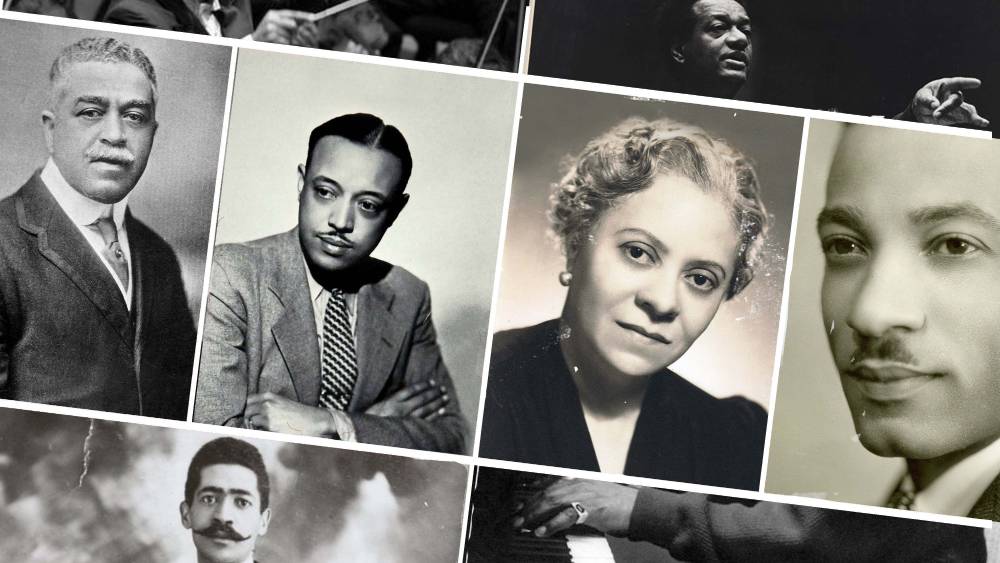Jim Crow Museum
1010 Campus Drive
Big Rapids, MI 49307
[email protected]
(231) 591-5873
~Tracey T.
Toledo, Ohio
 A: Contributions from Black composers, conductors, and musicians are not given much attention
in classical music, past or present. Black accomplishments are downplayed or erased,
and African Americans are underrepresented in scholarship, orchestras, executive roles,
and in audiences. Historically, classical music performances focused on a small circle
of white, male celebrities, ignoring female and non-white composers who had fewer
opportunities to establish professional careers. When professional musicians established
unions in the late 19th century, they were segregated leaving Black musicians to establish
their own companies and unions. During the 1940s and 50s, a few African American musicians
began playing in the larger orchestral venues, but the legacy of segregation continued
to divide the concert halls into the 20th century.
A: Contributions from Black composers, conductors, and musicians are not given much attention
in classical music, past or present. Black accomplishments are downplayed or erased,
and African Americans are underrepresented in scholarship, orchestras, executive roles,
and in audiences. Historically, classical music performances focused on a small circle
of white, male celebrities, ignoring female and non-white composers who had fewer
opportunities to establish professional careers. When professional musicians established
unions in the late 19th century, they were segregated leaving Black musicians to establish
their own companies and unions. During the 1940s and 50s, a few African American musicians
began playing in the larger orchestral venues, but the legacy of segregation continued
to divide the concert halls into the 20th century.
The classical canon’s focus on white composers is unsurprising, given the make-up of the peoples immigrating from Europe during the 18th, 19th, and early 20th centuries, who held considerable cultural sway in the United States. Even as African Americans shaped popular music, the white majority leaned on European traditions as an emblem of cultural supremacy, and little effort was made to cultivate homegrown American composers. Heinrich Schenker, who exerted much influence on American music theory disparaged jazz and “negro music” claiming that spirituals were “falsified, dishonest expropriation of European music.” Instead of appreciating the aesthetics and originality of African American music, he reduced spirituals to thievery, implying that Black people were incapable of producing good music on their own. Black musicians were not hired to play in ensembles, which relied heavily on immigrant labor instead: Germans gravitated toward the orchestras and Italians toward the opera. Wealthy white benefactors viewed orchestral music as an opportunity for the lower classes to better themselves via exposure to the “genius” of a select few.
Despite the focus on European composers, Black American classical musicians existed outside of the limelight. In 1893, the singer and composer Harry T. Burleigh befriended Antonín Dvořák, the new director at the progressive National Conservatory in New York City. Moved by Burleigh’s singing of spirituals, Dvořák believed that Black melodies should be the foundation of American music and knew that the African American body of music broke open European conventions of melody, harmony, and rhythm. George Gershwin also embraced Black music and the handful of African American composers who found success in the 1930s. Generations later, the work of African American composers William Grant Still, William Dawson, Florence Price, and Dean Dixon began to appear on orchestral programs. Black opera singers gradually made headway during the same period, culminating in breakthrough appearances by Paul Robeson, Jules Bledsoe, Marian Anderson, and Leontyne Price.
By and large, Black talent was funneled into jazz and other popular music genres instead of finding a home in classical music. James P. Johnson and Duke Ellington, who wrote symphonic works while playing piano and leading big bands, are usually included in the jazz canon exclusively. Many jazz musicians like Will Marion Cook, Billy Strayhorn, and Nina Simone, among others, began their training with classical music studies. Jazz is considered “America’s classical music” adding to the erasure of Black composers and musicians in academic curricula. Moreover, Black-led orchestral performances are often relegated to special events outside the main season, like Black History Month concerts or Martin Luther King Jr. Day celebrations.
Race and segregation shaped the United States, requiring contemporary organizations to examine how they recruit talent, hire leadership, market performances, publish materials, and teach curriculum. Less than 2% of musicians in American orchestras are Black and 4% of conductors are Black according to the League of American Orchestras. The Society for Music Theory reported that 84% of their membership is white and 90% of all full-time employees in music theory are white. Only 2% of the compositions from the most frequently used music theory textbooks (96% of the market) were written by non-white composers. This racial imbalance presents a biased framework that showcases white musicians as the standard of excellence without questioning the circumstances or conditions that were exclusionary to Black composers.
Jennifer Hasso
Education Coordinator
Jim Crow Museum 2021
Resources:
Classic FM. 13 Black conductors, past and present, who’ve inspired us from the podium Retrieved from https://www.classicfm.com/discover-music/instruments/conductor/black-ethnically-diverse-inspiring/
Ewell, P.A. (2020, September 2). Music Theory and the White Racial Frame. In Society for Music Theory. Retrieved from https://mtosmt.org/issues/mto.20.26.2/mto.20.26.2.ewell.html
Huizenga, T. (2019, September 20). Why Is American Classical Music So White? NPR. Retrieved from https://www.npr.org/sections/deceptivecadence/2019/09/20/762514169/why-is-american-classical-music-so-white
Morrison, M.D. (2019, December 1). Race, Blacksound, and the (Re)Making of Musicological Discourse. In Journal of the American Musicological Society. Retrieved from https://online.ucpress.edu/jams/article/72/3/781/107058/Race-Blacksound-and-the-Re-Making-of-Musicological
Music by Black Composers. Retrieved from https://www.musicbyblackcomposers.org
Ross, A. (2020, September 14). Black Scholars Confront White Supremacy in Classical Music. In The New Yorker. Retrieved from https://www.newyorker.com/magazine/2020/09/21/black-scholars-confront-white-supremacy-in-classical-music
The MET. The First Black Artists Arrive at the Met. Retrieved from https://www.metopera.org/discover/archives/black-voices-at-the-met/part-1-section-1/
The University of Michigan. (2021, February 26). Six Black Voices that Transformed Opera. Retrieved from https://ums.org/2021/02/26/six-black-voices-that-transformed-opera/
William, R. (2014, August 8). Great Divide at the Concert Hall. In The New York Times. Retrieved from https://www.nytimes.com/2014/08/10/arts/music/black-composers-discuss-the-role-of-race.html